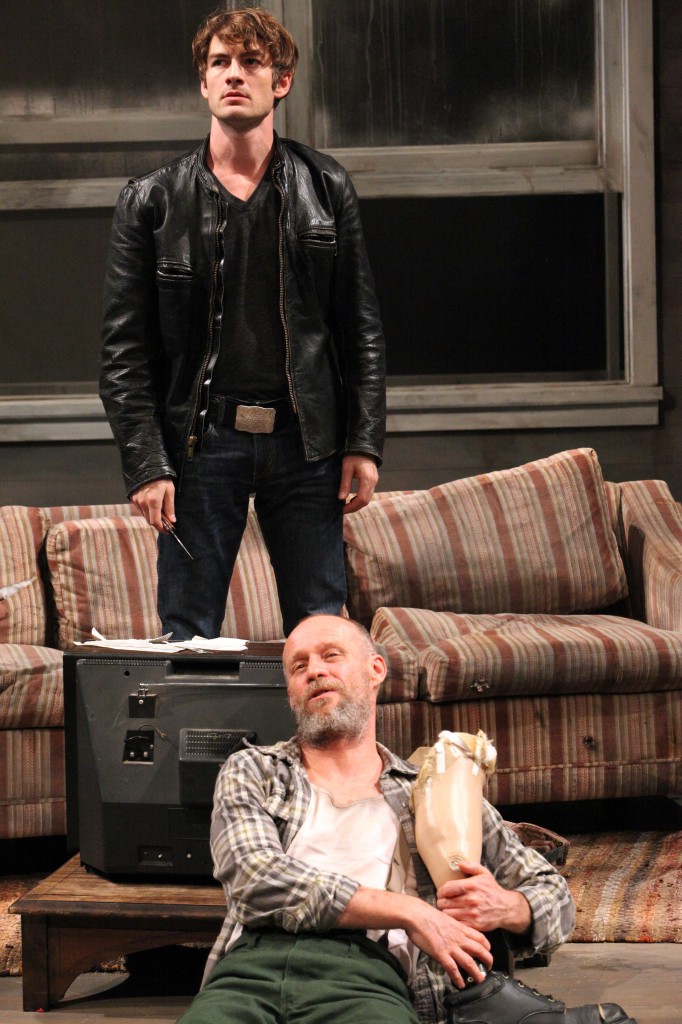
Vince (Patrick Alparone, standing) comes to terms with his family legacy with his grandfather Dodge (Rod Gnapp) in Sam Shepard’s Buried Child at Magic Theatre through October 6. Photo: Jennifer Reiley
EXTENED THROUGH OCTOBER 19, 2013
Buried Child by Sam Shepard. Directed by Loretta Greco. Magic Theatre, Fort Mason Center, 2 Marina Boulevard, Building D, 3rd Floor, San Francisco, 93123. 415-441-8822 OR or www.magictheatre.org. September 11 – October 6, 2013
BURIED CHILD rivets the audience to their seats
Opening night audiences at the Magic Theatre are very loyal and appreciative often times giving spontaneous standing ovations to a great or near great performance. Last night at the return of Buried Child to the Magic stage the applause was thunderous but nary a person standing. The entire evening was mesmerizing thus riveting the audience to their seats.
To inaugurate their 47th season the Magic has reached back into its archive for a revival of Sam Shepard’s Buried Child that he wrote when he was play-wright-in- residence in 1978. During the 12 years in that position the Magic also produced his True West (1980) and Fools for Love (1983). When Buried Child moved to New York in 1979 it won the Pulitzer Prize and Sam Shepard became a theatrical personage to reckon with. In the year 2000 he received a performance by the Magic of a new play, The Late Henry Moss with an all-star cast, including Sean Penn, Nick Nolte, Woody Harrelson and Cheech Marin at the Theatre on the Square in downtown San Francisco.
Shepard revised the Buried Child script for the Steppenwolf Company for their 1995 Broadway production. Using that script The Magic have gathered a superb cast, used every inch of the three sided stage with a fantastic set (Andrew Boyce) and as helmed by director Lorreta Greco it is an evening not to be missed. Even with all those accolades the entire play defies description and might be called abstruse realism. It certainly is a family play involving three generations living in an unnamed rural mid-west locale.
It is a thoroughly dysfunctional family with a deep dark secret tearing them apart and at the same time binding them together for emotional and culpable reasons. It begins with Dodge (Rod Gnapp) the alcoholic and dying septuagenarian patriarch sitting on an exceedingly worn sofa watching an ancient TV without sound with a light flickering on his face. He is having an extended conversation with his younger wife Halie (Denise Balthrop Cassidy) off-stage at the top of a two story staircase that is symbolic of the emotional as well as physical distance between them.
Tilden (James Wagner), a compellingly mentally crippled son has returned to the homestead under devious unexplained circumstances and is charged by Halie to look after his father. At the same time Dodge is charged with keeping him from going outside. Yet strangely Tilden harvests corn and carrots from the fields that have been barren for 12 years.
An eldest son Bradley (Patrick Kelly Jones) has lost a leg in a chain saw accident and has become maniacal terrorizing Doge and Tilden. There is reference to a younger deceased son Ansel who was Halie’s favorite and she fantasizes about erecting a bronze statue to his memory enlisting her paramour Father Dewis (Lawrence Radecker)to the effort. All the boys were athletic with competitive jealousy that carries over into their adult life.
Into this mélange enters Tilden’s young son Vince (Patrick Alparone) who has been away for six years and has returned to relive the past. When he is not recognized by the family he quickly learns Thomas Wolff’s truism you can’t go home again. Sanity is introduced by Kevin’s girlfriend Shelly (Elaina Garrity) whose inquisitive personality and understanding nature pries the naked truth from Dodge that leads to a gut wrenching final scene leaving the audience stunned.
With the exception of the rightfully underwritten part of Father Dewis, Shepard has created fully rounded realistic characters while placing them in a mystical family conclave. Rod Gnapp, who never leaves the stage, gives a tremendous performance combining pathos with humor yet blending into the ensemble. James Wagner uses spare full body movements and facial expressions capturing the mental retardation of Tilden. Patrick Kelly James’ realistic anger permeates the stage. Patrick Alparone and Elaina Garrity dominate the second act almost upstaging Rod Gnapp who has a brilliant denouement speech. It seems that Shepard has given short shrift Halie and Densie Balthrop Cassidy’s performance defies accolades although her off-stage dialog with Rod Gnapp is beautifully timed.
You have the facts but it is neither hardly a full discussion of Shepard’s motivations nor the technical structure of this particular or subsequent plays. Questions will remain when you leave the theater after seeing this performance. Running time 2 hours and 10 minutes including the intermission.
Kedar K. Adour, MD
Courtesy of www.theatreworldinternetmagazine.com


